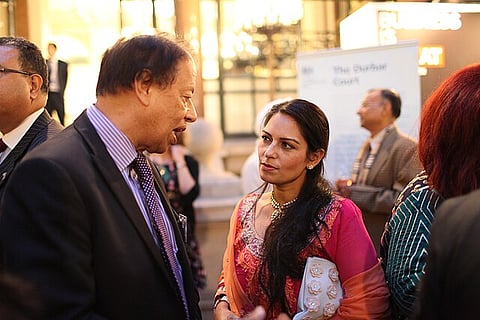
- Home
- NewsGram USA
- India
- न्यूजग्राम
- World
- Politics
- Opinion
- Entertainment
- On Ground
- Culture
- Lifestyle
- Economy
- Sports
- Sp. Coverage
- Misc.
- NewsGram Exclusive
- Jobs / Internships
- Interview

By Dr. Kumar Mahabir, Anthropologist, Editor, Publisher, Indo-Caribbean Cultural Centre
Decolonisation is a multifaceted concept that includes a broad range of social, political, and cultural processes aimed at dismantling the structures and legacies of colonialism. It implies a transformative attempt to challenge and rectify the historical injustices, power imbalances and cultural dominance imposed by colonial powers on colonized peoples and territories. Decolonisation means reclaiming indigenous and traditional knowledge, practices and identities while confronting and subverting the hegemonic narratives and systems that perpetuate oppression and inequality. It is a complex and ongoing struggle for self-determination, equality, and the restoration of agency, highlighting the importance of acknowledging diverse histories, promoting inclusive voices, and fostering equitable relationships between nations and communities.
Decolonizing the Asian Indian mind in the diaspora requires a critical examination and deconstruction of the pervasive colonial narratives, ideologies and mental frameworks that continue to shape the experiences and identities of Asian Indian communities living outside their countries of origin. It includes challenging the internalised structures of power and the internalised oppression that have been inherited from the colonial past. Decolonisation in the Indian diaspora necessitates centering and amplifying marginalised voices, promoting cultural resurgence and self-determination, and reclaiming indigenous and traditional knowledge and practices that have been marginalised or erased. It also involves promoting solidarity among diverse Indian communities, and forging connections with other anti- colonial and liberation movements, all with the aim of creating spaces for self-expression, dismantling stereotypes, and reclaiming agency in shaping narratives and experiences.
A Pan-Caribbean ZOOM Public Meeting was hosted by the Indo-Caribbean Cultural Centre (ICC) (25/6/23). It was chaired by Aashriya Anroedh from the Netherlands and moderated by Shalima Mohammed from Trinidad. The speakers were Irfan Pullani (India), an international lawyer who serves as Secretary-General of the Indian Reunification Association (IRA), promoting peace and unity; Sandew Hira (Netherlands/ Suriname), Secretary of the Decolonial International Network Foundation (DIN), and co-editor of the book series Decolonizing the Mind; and Ravi Dev (Guyana), former New York corporate executive and attorney, and Ex-Member of Parliament and Indian civil rights activist, and now newspaper columnist and media consultant See the unedited recording of the program: https://www.youtube.com/live/1BxszkdKGnU
IRFAN PULLANI from India said, “My perspective today is to invite your attention to how colonization was engineered within our civilisation. India’s Prime Minister Shri Narendra Modi called for the shedding of the colonial mindset which is still entrenched in the psyche of many after 75 years of independence. To understand our culture and heritage, we must dive into the last 5000 years of Indian history. We have been so influenced by the Western thought that we have created separate religions. Hinduism, Buddhism and Jainism are perceived as distinct religions, even though they represent the same paths. We must disentangle ourselves from the Western world and refuse to let our culture be judged by an alien caught under alien laws. We should not compare ourselves to Western ideals to feel either shame or pride. Instead, we should embrace our true essence. Mahatma Gandhi achieved remarkable success as he continuously emphasized our philosophical heritage. He never severed his ties, but clung to them as he sought to resort to the spiritual unity of people, dismantling the barriers between Western allies and the masses.”
SANDEW HIRA from the Netherlands said, “Colonialism is a collection of global systems and institutions that the Global North has created to rule the world in a colonial world civilisation. The colonisation of the mind is mental slavery. What is decolonising the mind? Decolonising the mind has three dimensions: a critique of Eurocentric knowledge production, evaluating concepts from other civilizations with Eurocentric concepts without racist prejudice; and making a link to practical society. A critique of the historiography of indentured labour, decolonising the archives, bringing Indian civilisation into the new plural world civilisation, a decolonising the mind view on race relations, and decolonising the public memory is essential in the application of decolonising the mind in the Indian diaspora.”
RAVI DEV from Guyana said, “The British constructed three schools, and our elite had to become educated involuntarily. If you passed through these schools, you were ‘educated’. The Indians before who had constructed a prosperous civilization for the past 5000 years weren't ‘educated’ and had to be educated in the eyes of the British. These ‘uneducated peasants’, derived from Bhojpuri culture, understood the technology of rice. Guyana couldn't produce 70,000 tonnes of sugar, but today we are producing 600,000 tonnes of rice on the backs of those peasants. Those running our countries have not decolonised their own minds, and we have to intercede. Today, we are being told that it is the arrival of indentured Indians that made us into the plural society. Our challenge is not to obliterate differences but to deal constructively with the differences. We should be proud of our contribution in upholding and sustaining the Caribbean. (Reported by Trishana Jeenath)
Correspondence – Dr Kumar Mahabir, Trinidad and Tobago, Caribbean. WhatsApp +1 868 756 4961. E-mail: dmahabir@gmail.com
(NG-FA)
